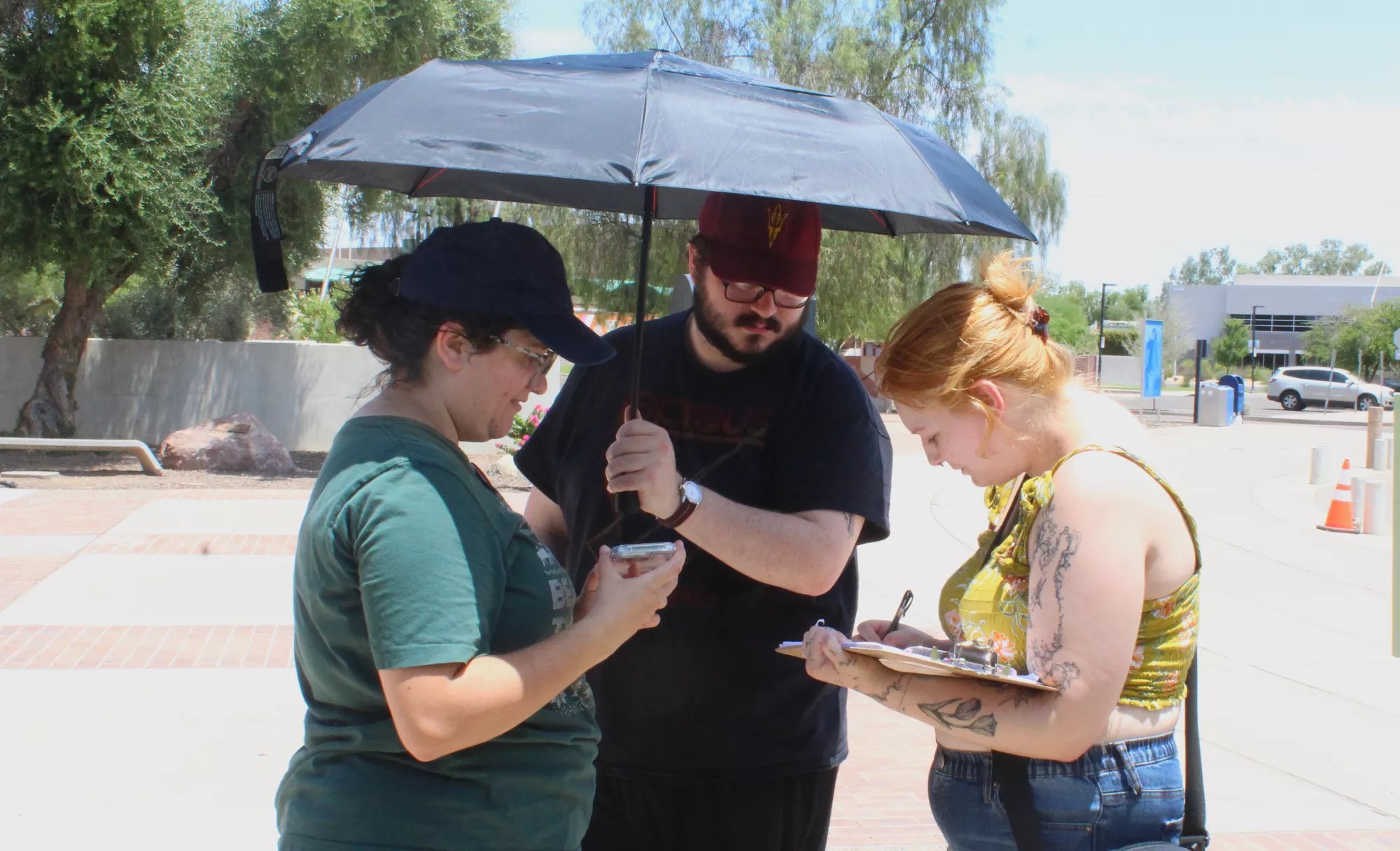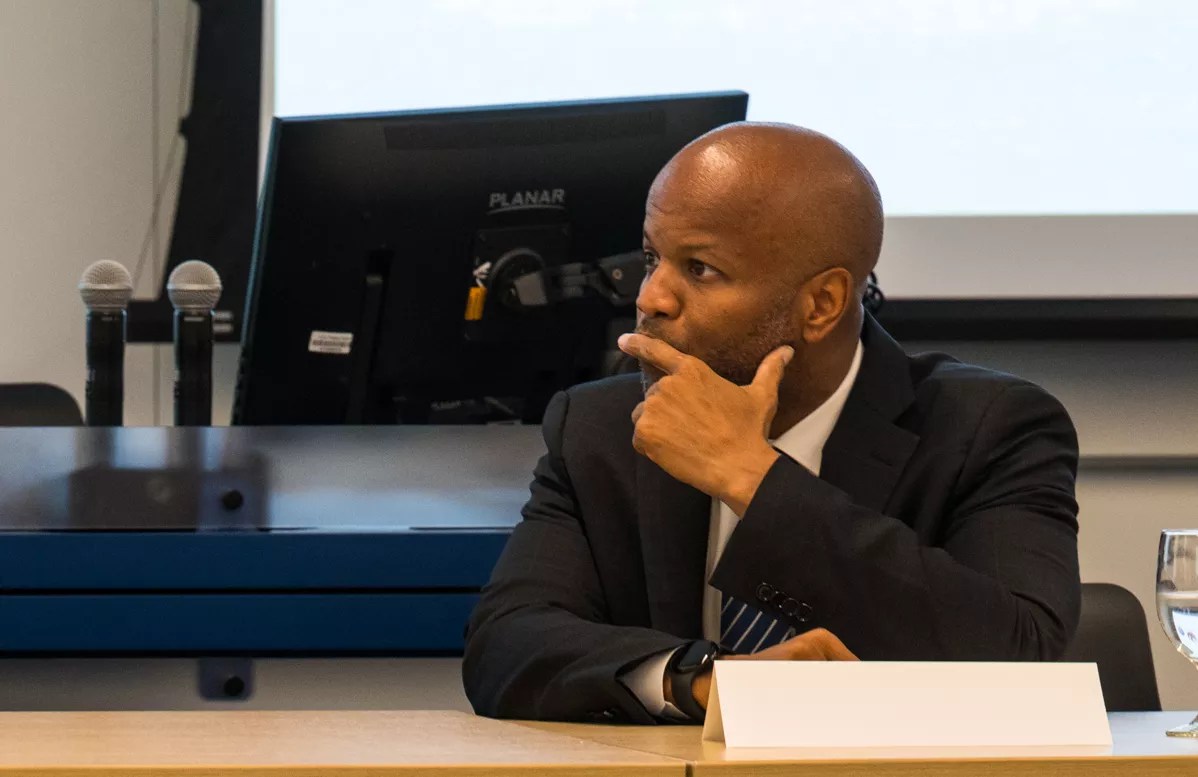
TJ L’Heureux

Audio By Carbonatix
The fate of a controversial new Tempe parks ordinance will now be up to voters. A petition to place a repeal measure on the ballot for the city’s March 10 election has officially garnered enough signatures to qualify.
The Tempe City Council passed the ordinance, which creates new requirements for public gatherings in city parks, in the face of vociferous opposition at a July 1 meeting. Opponents have said the new ordinance will infringe upon freedom of assembly and have called its passage a thinly veiled attempt to crack down on mutual aid groups that hold events in the parks. The city claims the ordinance is needed to ensure the parks are used responsibly.
Almost immediately after the city council unanimously passed the ordinance last month – at 1 a.m., after 77 members of the public spoke against it – the local chapter of the Democratic Socialists of America and other organizers kicked off a signature-gathering campaign to put the issue on the ballot. On Tuesday, Tempe City Clerk Kara DeArrastia certified that organizers had gathered 3,909 valid signatures, far exceeding the required threshold of 2,440.
The city council will officially vote to place the issue on the ballot at its Aug. 28 meeting.
“It’s a testament to the huge community support that rallied behind saying no to this ordinance,” DSA chapter co-chair Dillon Wild told Phoenix New Times. “Tempe voters made it clear that they want to decide the fate of this ordinance at the ballot box.”
The organization, which has a large presence in Tempe, led the signature-gathering campaign. Wild said that of the 143 signature collectors, 50 were DSA volunteers who collected a combined 2,545 signatures. Other involved groups were the Young Democrats of Arizona, Tempe 1st, Tempe Neighborhoods Together and Arizona Asian American Native Hawaiian and Pacific Islander for Equity, the last of which gathered more than 1,000 signatures.
“The community has come together to show city council that fast-tracking an unfair ordinance after hours of backlash from voters like us is not how we should do things in Tempe,” Wild said. “We want a council that partners with the community, not one that ignores it.”
Tempe spokesperson Kris Baxter-Ging told New Times on Wednesday that the old ordinance will remain in place until the March referendum. If voters overturn the new law, that original ordinance will remain in effect and city staff will have to go back to the drawing board if they want to try again to update it. If the referendum fails, the new ordinance will officially take effect.
In a text message to New Times, Tempe Mayor Corey Woods said that it’s now a waiting game until March.
“We heard from many members of the community during the July 1st meeting and have continued listening to questions, concerns and feedback since then,” Woods said. “Now that the signatures have been submitted and certified, the City Council and I will just have to wait and see what the final outcome is.”

Tempe Mayor Corey Woods says the new city ordinance is not discriminatory, despite significant criticism that it could be.
U.S. Department of Labor/Flickr/CC BY 2.0
Why is the ordinance controversial?
Under the leadership of City Manager Rosa Inchausti, Tempe has used its special events ordinance to crack down on community groups gathering in city parks to distribute food and clothes to unhoused people and connect them to social services. The council has passively consented.
The city cited AZ Hugs founder Austin Davis with 34 violations of the ordinance, ultimately reaching a plea deal that kept him out of city parks well into 2026. That was before Tempe cops arrested him for filming them earlier this month, an incident that resulted in dropped charges and a plea deal that ended Davis’ ban from the parks.
Earlier this year, Tempe dropped a similar charge against New Deal Meal founder Ron Tapscott for giving meals to unhoused people in the parks without a permit. Notably, Tapscott, Davis and homeless advocate Jane Parker are suing the city over the old version of the ordinance and have indicated the change in city code will not alter their civil rights complaint against Tempe.
Additionally, for years, DSA has organized the “Really Really Free Market,” which allowed people in need to get critical resources like clothes, food, water, baby food and more in Daley Park. But in March, the city dropped the hammer on that event. Sarah Covey and Nate Landis, the co-chairs of mutual aid events, told New Times that the city began sending cops to ensure the event didn’t take place. The city has denied the group a permit.
The new law would impose even stricter changes on certain gatherings in public parks, as well as create requirements for the use of park ramadas. Aside from civil rights implications – critics say the new ordinance invests too much power in city staffers to approve or deny gatherings – opponents also felt the ordinance was rushed into passage with little meaningful public input and made the consequences of the ordinance change opaque. That criticism was underscored the night the change passed when even a city councilmember admitted that the ordinance’s ramifications confused her.
At the July 1 council meeting, City Attorney Eric Anderson admitted the process of changing the ordinance was sped up. Speaking to New Times earlier this summer, Woods defended the accelerated timeline and lack of public engagement, blaming the ongoing civil rights lawsuit brought by Tapscott, Davis and Parker for the accelerated timeline.
Organizers were ready for the law to be swiftly approved, though. Now they face a taller task – instead of convincing 2,400 Tempe residents to sign a petition, they have to convince many more residents to vote their way.

Tempe residents gathered before a July 1 city council meeting to oppose a proposed new ordinance that would place new restrictions on public gatherings.
TJ L’Heureux
What’s next?
After the council officially places the referendum on the ballot, it will be a race to the city’s March 10 city council election. Since the vote is a choice between “yes” or “no,” the issue will be decided by a simple majority.
Tapscott told New Times he expects voters to overturn the new parks ordinance.
“The people who live in Tempe and use the parks in Tempe – and the people who support humane care for those who are poor and disadvantaged – will prevail,” he said.
With more than six months until the election, the referendum may become a major issue for the councilmembers who are up for reelection. Councilmembers Jennifer Adams, Bedetta Hodge and Arlene Chin are running for reelection, facing challengers that include John Elvis Taska, Robert Nichols and Brooke St. George. All three challengers happen to be pro-repeal.
The pro-referendum effort will face some systemic challenges. City elections generally get low turnout – only 24,397 people voted in the city’s March 2024 election, representing 28.86% turnout – so voter activation may be the name of the game. The official ballot language for the measure may be written in something closer to legalese, requiring organizers to raise awareness. Then again, the low-turnout nature of local elections also means it may not take a Herculean effort to pass the measure.
“We’re only just getting started,” Wild told New Times on Wednesday. “We’ll be in the community talking to folks about the far-reaching, negative consequences this ordinance would have on our community, and why we’re coming together as Tempe residents to vote no.”
Just how much opposition the effort faces remains to be seen. During the signature-gathering phase, petitioners encountered paid “petition blockers” hired by a political consulting group with unknown backers. The counter-petitioners handed out factually and typographically flawed flyers about the parks ordinance and the repeal effort. In addition, someone identified only as “Pat” began sending Tempe residents text messages campaigning against the referendum.
Wild thinks these efforts probably backfired.
“We found it surprising that actors in the community – we don’t know who – were willing to go to such lengths and to spend so much money to try and stop Tempe voters from having the chance to weigh in on this issue,” he said. “Our experience was that their effort to try and stop people from signing the petition really backfired and led to even more community support. There were even more folks coming to us to say, ‘Hey, where can I sign? I got this text from Pat from Tempe. It’s weirding me out – I don’t know why people think we shouldn’t have the chance to vote on this.'”
It’s unclear who paid for the campaign; since it wasn’t technically over an election issue at the time, campaign finance laws don’t require disclosure. But anyone organizing and funding an anti-repeal campaign going forward will have to name funders. Wild wonders if that will make whoever funded the anti-petition campaign “think twice.”